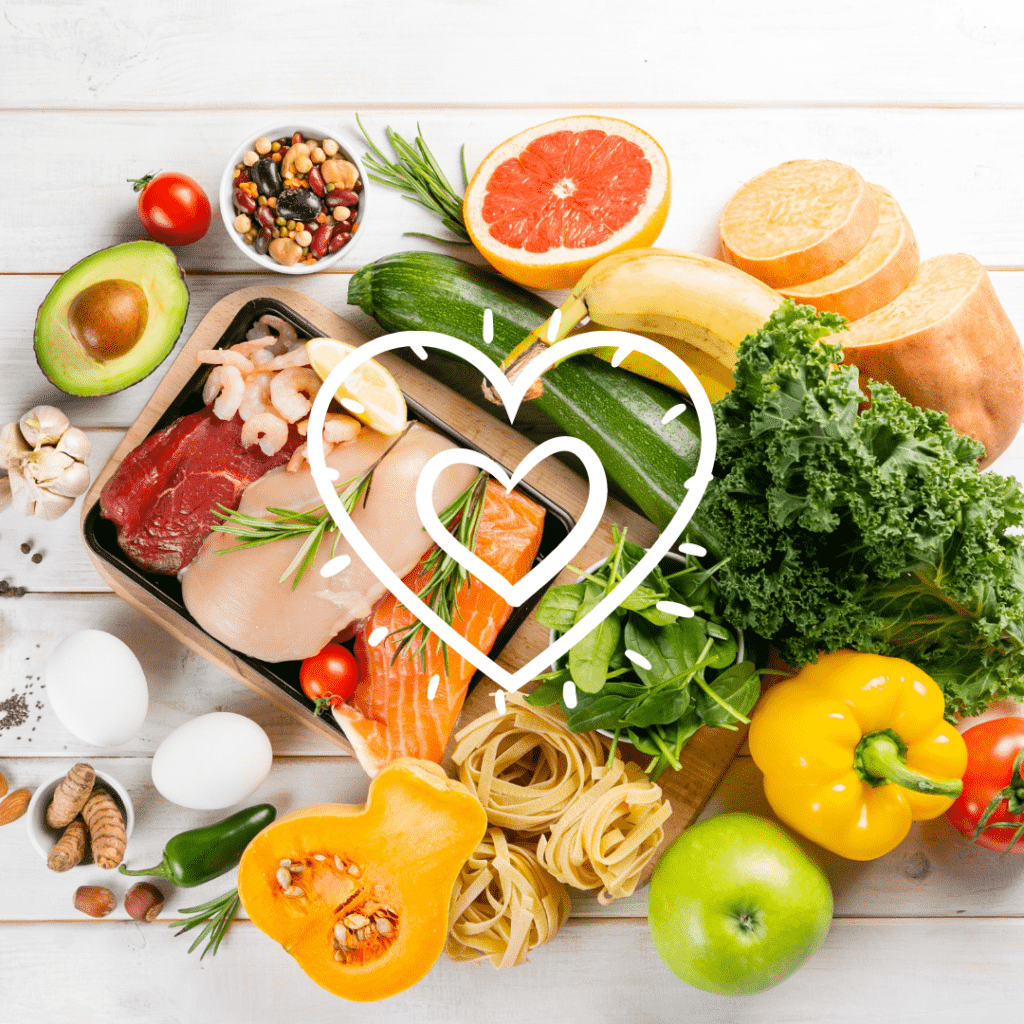
Fall In Love with All the Macronutrients
I am a big proponent of incorporating all macronutrients into our diet and not eliminating one or eating a high percentage of another, Keto for example. All the macronutrients play a vital role in our health and overall well-being.
Sure, a low-carb-high-fat diet can lead to weight loss but can leave you with long-term consequences. Women especially, need carbohydrates, there are several reasons for this. As women we need carbohydrates for proper endocrine function or in other words to keep our thyroid gland healthy and maintain our metabolism.
A low carbohydrate diet isn’t necessary for women as we are already more proficient in burning fat for fuel compared to men. Our muscle mitochondria already use, and uptake free fatty acid and estrogen increases free fatty acid use which spares carbohydrates. Making it even more vital we get adequate carbohydrates in our diet to fuel those intense workouts.
Let us review the three macronutrients and how crucial each one is in our overall health and performance.
Carbohydrates
You shouldn’t just eliminate this essential macronutrient. Carbohydrates are essential for everyday health. They support our central nervous system, maintain red blood cell production, keep the immune system running, and fuel our brain where our brain requires roughly 60 % of your body’s resting glucose utilization.
Carbohydrates help the body burn fat; most exercise physiologists say “Fat is burned in a carbohydrate flame” which helps preserve muscle tissue by preventing the body from using protein as a primary energy source. Also, glycogen (stored carbs in the muscles and liver) supply is more limited in women compared to men. In other words, due to our high estrogen levels, we rely less on carbs and more on fat than men, emphasizing the fact we really need to supplement with carbohydrates to fuel anaerobic activity to push past any threshold since we rely less on our glycogen stores compared to men.
Our brains need carbohydrates and evolve based on the consumption of carbohydrates. As mentioned earlier our brain uses roughly 60% of blood glucose.
Another reason not to go extremely low carb is that is our primary source of serotonin. So, if you suffer from depression or anxiety, reducing this vital macronutrient can further potentiate these conditions.
As a woman, we become more sensitive to carbohydrates as we age because of the decline in estrogen levels, so eating a diet too high in carbs is detrimental from blood sugar and metabolism standpoint. It’s about balance, consuming between 40-45% of your daily calories from whole food carbohydrates. Starchy vegetables such as sweet potatoes, yams, and winter squash as well as root veggies such as carrots, onions, and garlic are superior forms of carbohydrates from a nutritional standpoint.
Performance – Low-carbohydrate diets increase fatty acid oxidation during exercise and encourage intramuscular fat storage. If there isn’t enough primary fuel to support the body under stress, the body will go for a secondary source of fuel – fat, then will store more fat next time it encounters that stress.
In women in particular, high-fat, very low-carb eating elevates levels of cortisol, which increases catabolism and hinders protein synthesis.
Carbohydrate sensitivity changes over the course of a woman’s life but carbs are still essential, it’s wise not to cut them out completely.
Protein
Protein is a must! If you want to stay active, maintain muscle mass, and maybe lose more weight protein is key.
Protein is crucial to not only muscle building, repair, growth, and recovery, and fat mobilization but has so many functions within the body including immunity, hormones, enzymes, sleep, digestion, and even ovulation.
Reasons to incorporate more protein into your diet:
- Reduces obesity
- Reduces osteoporosis
- Reduces diabetes
- Reduces heart disease
Protein takes more work to digest than other foods, so it burns calories just by processing it. It increases satiety and maintains muscle tissue (crucial as we age).
Sources of complete protein include meat (grass-fed, pasture-raised preferred), wild-caught fish, pasture-raised eggs, and most dairy products. Incomplete protein sources coming from plant sources include nuts, whole grains, and vegetables.
Aim for 30-35% of your daily calories from protein. If you are like me and find it hard to get enough protein in your diet, here is a list of protein rich foods. It’s a good rule of thumb to aim for 1g/1lb per day in protein, so say you’re 135 lbs. you would aim to consume 135 g of protein per day.
- Lean Grass-fed beef (not raised with antibiotics or hormones) 23.3g in 4 oz.
- Ground Turkey (organic, raised with no antibiotics, no hormones) 22.3g in 4 oz.
- Chicken breast (pasture raised, no antibiotics, no hormones, organic) 22 g in 4 oz.
- Wild caught fish – salmon 19g in 4 oz., cod 23.7g in 4 oz., halibut 21.1g in 4 oz.
- Tuna (wild caught) 22g in 4 oz.
- Tempeh 20.6g in 4 oz.
- Lentils 18g in 1 cup
- Protein powder (plant based) 16-22g in 1 scoop*
- Seafood (wild caught – shrimp 15g in 4 oz.)
- Sliced deli turkey 10g in 5 slices
- Lean Beef Jerky (grass-fed & grass-finished beef w/ no MSG, no nitrates, or nitrites) 9g in 1oz.
- Collagen powder 8g in 1 scoop
- Edamame (non-GMO, organic preferable) – note these contain soy 8g in ½ cup
- Brussel sprouts 8g in 1 cup
- Peanuts 7.3g in 1 oz.
- Red Beans 7g in ½ cup
- Almond butter 7g in 1 tbsp.
- Turkey bacon 6g in 1 slice
- Eggs (pastured raised, organic) 6g each egg (3 whole eggs provide 18 g of protein)
- Almonds 6g in 1 oz.
- Pistachios 6g in 1 oz.
- Quinoa 6g in ¼ cup dry
- Rolled oats (organic & gluten-free) 6g in ½ cup
*My recommendation when choosing a healthy protein powder is to find one that is high in protein (~20 gm), low in calories (150 calories or less), low in fat (less than 3 gm), low in carbohydrates (less than 6 gm), and low in sugar (less than 3 gm).
Fat
Fat is an essential source of fuel for aerobic exercise and life itself. It protects your inner organs and allows estrogen to function properly for regular menstruation, fertility, and bone health. Essential fatty acids are necessary for immune and nerve cell function.
Stay away from trans fats or partially hydrogenated oils as these are highly processed and refined, offering no nutritional value. These processed oils are high in omega-6 fatty acids which is pro-inflammatory (whereas omega-3 fatty acids are anti-inflammatory) and they increase the risk of heart disease, diabetes, obesity, and even cancer.
Saturated fats have gotten a bad rap, but they are not so bad in moderation. There is evidence that saturated fats may help balance cholesterol levels and even lower inflammation. Saturated fats from whole, natural, unrefined, and unprocessed sources which include grass-fed beef, organic chicken, eggs, and unrefined organic coconut oil.
Aim for 30% of your daily calories from fat by eating healthy, whole foods, such as olive oil, nuts, seeds, nut butters, avocado, and fish (which contains anti-inflammatory omega-3 fatty acids).
To my ladies that experience menstrual symptoms around their period, healthy fats such as fish oil (omega-3’s) and evening primrose oil (EPO) can reduce cramping and back pain.
The macronutrient breakdown I use myself and recommend to clients is 40-30-30; 40% of daily calories from carbohydrates, 30% from protein and the other 30% from fat. I find that I am fueled properly with this ratio and don’t feel deprived in any way. Each macronutrient provides our body with the building blocks it needs to maintain optimal health and performance.
Reference: Sims, Stacy. Roar. New York, NY: Rodale; 2016.
